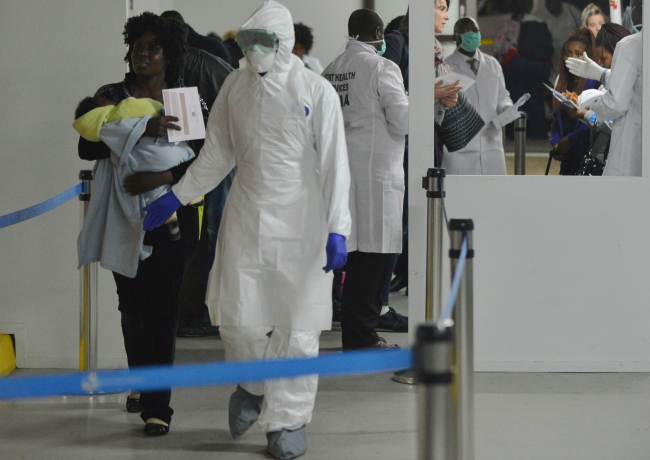Aid workers offer hope in Ebola battle
Red Cross officials see dramatic drop in bodies collected in Liberia
By Korea HeraldPublished : Oct. 29, 2014 - 21:23
MONROVIA (AFP) ― The Red Cross offered hope Tuesday of a turning point in the battle against the deadly West African Ebola outbreak, saying it had seen a dramatic drop in bodies collected in Liberia’s capital.
The aid group announced its workers were now picking up little over a third of the late September peak of more than 300 bodies a week in and around Monrovia ― an indication, it said, that the outbreak was retreating.
The announcement appears at odds with the assessment of U.N. chief Ban Ki-moon, who warned Tuesday at a crisis meeting in Ethiopia that the spread of the virus continued to outpace the response, while the head of the World Bank appealed for thousands more medics.
The Red Cross comments came a week after the World Health Organization concluded in an update on the crisis that transmission “remains intense” in the capitals of Liberia and neighboring Guinea and Sierra Leone.
The aid group announced its workers were now picking up little over a third of the late September peak of more than 300 bodies a week in and around Monrovia ― an indication, it said, that the outbreak was retreating.
The announcement appears at odds with the assessment of U.N. chief Ban Ki-moon, who warned Tuesday at a crisis meeting in Ethiopia that the spread of the virus continued to outpace the response, while the head of the World Bank appealed for thousands more medics.
The Red Cross comments came a week after the World Health Organization concluded in an update on the crisis that transmission “remains intense” in the capitals of Liberia and neighboring Guinea and Sierra Leone.

Fayah Tamba, head of the Liberian Red Cross, said his workers collected 117 bodies last week from Montserrado county, which includes Monrovia, noting a steady decline from the high of 315 from Sept. 15 to 21.
“I am sure you don’t need a rocket scientist to tell you that the cases are dropping,” he told private radio station Sky FM.
The Ebola outbreak has left almost 5,000 dead, nearly all in West Africa.
It has led to canceled flights, border closures and a firestorm of criticism in the United States over its treatment of returning health workers.
Another country in West Africa, Mali, is scrambling to prevent a full-blown outbreak after a 2-year-old girl died from an Ebola infection following a 1,000-kilometer bus ride from Guinea.
Liberia has been hit worst, with 4,665 recorded cases of infection and 2,705 deaths, according to the WHO, relying on figures however which are now 10 days out-of-date.
Ban told reporters in Addis Ababa he was planning to visit Liberia and its stricken neighbors at an “opportune” time. He urged the international community to send more medical teams to fight the epidemic.
“Transmission of the virus continues to outpace the response effort of the international community,” he said after a meeting of the heads of the U.N., African Union and the World Bank in the Ethiopian capital.
Ban, who on Monday had criticized the enforced quarantine in the United States of an American nurse who had returned from Sierra Leone, said the only way to stop the epidemic was “at its source.”
“The longer the epidemic rages, the greater the risk of spread to other countries. Mali is the latest example in this regard,” he added.
World Bank chief Jim Yong Kim echoed the warning in an apparent swipe at developed countries which have not sent medical teams to the region, saying Ebola was “not an African crisis ... it is a global crisis.”
“We’ll need a steady state of at least 5,000 health workers from outside the region ... those health workers cannot work continuously ― there needs to be a rotation,” he told reporters.
Kim said medics should remember their vocation and their professional oath to save lives, and not shy away from going to a problem area.
“Right now, I’m very much worried about where we will find those health workers,” he said.
Shortly after Kim’s plea, France pledged $25.4 million to fight Ebola, including opening several care centers in Guinea.
Ebola can fell its victims within days, causing severe fever and muscle pain, weakness, vomiting and diarrhea. In many cases it shuts down organs and causes unstoppable bleeding.
The tropical virus is spread though close contact with the sweat, vomit, blood or other bodily fluids of an infected person. No widely available medicine or vaccine exists.
Samantha Power, the U.S. ambassador to the U.N., traveled from Sierra Leone to Liberia on Tuesday for the third leg of a tour of the three worst-hit nations aimed at garnering global support for the Ebola response.
“My main message is that we will beat Ebola,” Power said after meeting Liberian President Ellen Johnson Sirleaf.
“America will work with Liberia to end the stigma on the country,” she said. “We got our forces on the ground, we have our military and experts ... to contain the virus.”
In America meanwhile, a Texas nurse who was the second U.S. health-care worker infected with Ebola while caring for a deceased Liberian patient was released from a hospital after being declared cured of the virus.
-
Articles by Korea Herald



![[Exclusive] Korean military set to ban iPhones over 'security' concerns](http://res.heraldm.com/phpwas/restmb_idxmake.php?idx=644&simg=/content/image/2024/04/23/20240423050599_0.jpg&u=20240423183955)
![[AtoZ into Korean mind] Humor in Korea: Navigating the line between what's funny and not](http://res.heraldm.com/phpwas/restmb_idxmake.php?idx=644&simg=/content/image/2024/04/22/20240422050642_0.jpg&u=)




![[Graphic News] 77% of young Koreans still financially dependent](http://res.heraldm.com/phpwas/restmb_idxmake.php?idx=644&simg=/content/image/2024/04/22/20240422050762_0.gif&u=)
![[Herald Interview] Why Toss invited hackers to penetrate its system](http://res.heraldm.com/phpwas/restmb_idxmake.php?idx=644&simg=/content/image/2024/04/22/20240422050569_0.jpg&u=20240422150649)





![[Exclusive] Korean military to ban iPhones over security issues](http://res.heraldm.com/phpwas/restmb_idxmake.php?idx=652&simg=/content/image/2024/04/23/20240423050599_0.jpg&u=20240423183955)



![[Today’s K-pop] Ateez confirms US tour details](http://res.heraldm.com/phpwas/restmb_idxmake.php?idx=642&simg=/content/image/2024/04/23/20240423050700_0.jpg&u=)